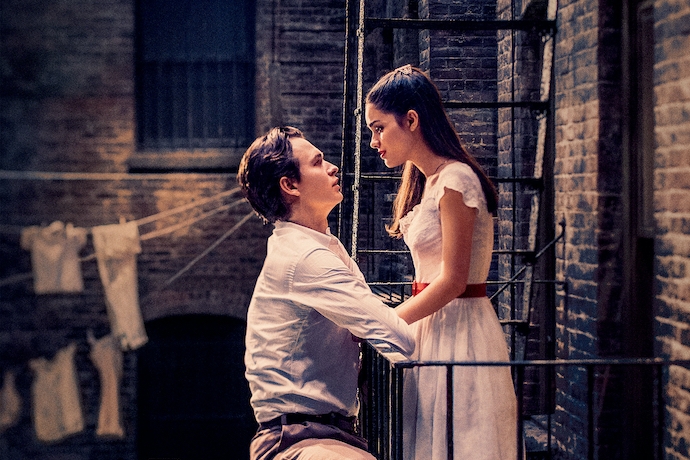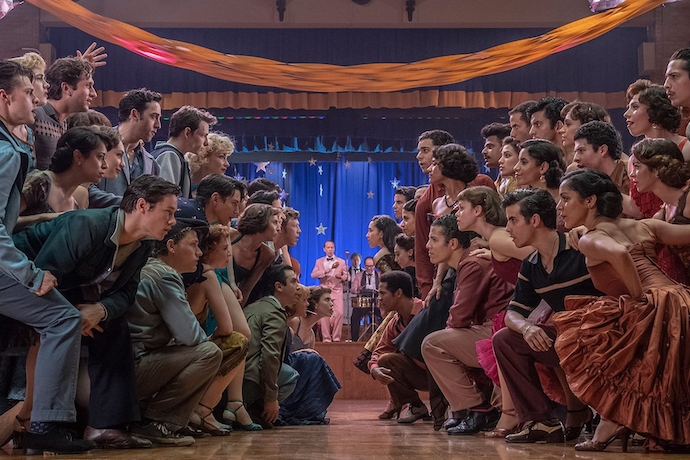Review of Spielberg’s Almost Perfect ‘West Side Story’
My ‘old school’ nature causes me to cringe at the thought of classic films being remade. Why mess with something that’s already beloved? However, since we know this happens (and will continue to happen), let’s at least breathe a sigh of relief that a true lover of cinema and one of our legendary filmmakers, Steven Spielberg, is responsible for the new West Side Story. Teaming once again screenwriter Tony Kushner (Munich, Lincoln), the love and admiration of the 1957 stage production, its music, and the 1961 film (by Robert Wise) shine through in this beautiful presentation. It’s Spielberg’s 35th movie, yet it’s his first musical. You will note a few changes from the stage production and original film, but the timing of a couple of songs, more violent fighting, and additional on-location scenes all blend seamlessly into this version.

Kushner’s adaption of Arthur Laurents’ original work contributes to the contemporary, yet nostalgic, feeling. It maintains the “Romeo and Juliet” story of star-crossed lovers at the core of a turf battle between the Sharks (Puerto Ricans) and Jets (white immigrants), which is driven by a prejudice that leads to conflict. Sound familiar? It could be taken from the local news headlines just about any day over the past few years. What also hasn’t changed is that the Sharks and Jets are so blinded by hate and pride that they can’t see how much they have in common. In fact, the point is driven home in the film’s opening. Cinematographer and two-time Oscar-winner Janusz Kaminski (Schindler’s List, Saving Private Ryan) has his camera soaring and swooping to show us the neighborhood and ongoing demolition before zeroing in on a sign “Property Purchased by New York City for Slum Clearance”. It comes in like a wrecking ball (literally). The two factions are fighting over turf that will soon be transitioned to Lincoln Center and high-dollar real estate.
Ansel Elgort stars as Tony, the former leader of the Jets attempting to find a new path for his life after spending a year in prison for nearly killing an Egyptian immigrant in a rumble. Rachel Zegler, in a remarkable silver screen debut, stars as Maria, a bright-eyed Puerto Rican who sees the upside to limitless opportunity. Early on, we get our first conflict between the rival gangs, which introduces us to Riff (a terrific Mike Faist) as the quick-tempered Jets leader so desperate to protect the neighborhood, and Bernardo (a dynamic David Alvarez), Maria’s older brother and proud leader of the Sharks – whose goal is to carve out a place in the new land as equal citizens. That first brawl gives Spielberg a chance to show off the choreography, as well as the new approach to fight scenes, which are less balletic and more bone-crunching. It’s also the first run-in with local cops, Officer Krupke (Brian d’Arcy James) and Lt. Schrank (Corey Stoll), neither of whom have much empathy or respect for the two gangs.
Tony and Maria get their ‘eyes lock across the gymnasium during the dance’ moment that really lights the candle for the big rumble. Of course, this is one of the most famous musicals of all-time, and the songs have become iconic. Elgort is handsome and has a smooth singing voice, but it’s Ms. Zegler whose voice transcends and sounds heaven-sent. If there is a negative, it’s that no one will be able to sing along with her, as she notes most can only dream of. But listening to her sing is reward enough. Beyond the singing, it’s the dance choreography that most recall, and although eclipsing what we saw in the original movie is beyond reach, this work of this cast will not disappoint anyone. The dance numbers are exhilarating and colorful. It’s energized entertainment with a message.

Ariana DeBose is outstanding as Anita, and takes the lead on “America,” perhaps the most inspiring and fun musical number ever put on screen. In addition to her singing and dancing, Ms. DeBose delivers a superb performance in the role that won an historic Oscar for Rita Moreno in the 1961 film. Sixty years later, the now 89-year-old Ms. Moreno appears as Valentina, the widow of Doc. She now runs Doc’s Drug Store and is acting as surrogate mother to Tony. It’s certainly no cameo, and though Ms. Moreno doesn’t have a dance number, she does get to sing “Somewhere,” and this time is on the heroic end of the rape scene. She is the connective fiber to the original film and delivers a heart-warming and is a strong presence where needed.
Other key supporting roles are Chino, Maria’s would-be suitor, played by Josh Andres Rivera, and Anybodys, played by Iris Menas in a non-binary rather than tomboyish portrayal of the one skulking in the shadows. It’s no surprise that Riff and Bernardo and Anita are the heftiest roles, and all three actors nail their parts. The big (and pleasant) surprises are newcomer and future star Rachel Zegler and the return of Ms. Moreno. Zegler sings “I Feel Pretty” while working the cleaning crew at Gimbel’s, and her divine sweetness gets blown away in the finale, exhibiting an acting range that complements that voice.
The always stunning score from composer Leonard Bernstein sound amazing as performed by the New York Philharmonic, and much of original choreographer Jerome Robbins’ work is reproduced here. It’s unfortunate that renowned lyricist Stephen Sondheim passed away mere days before the premiere, but his work lives on through new voices. “Tonight” and “Cool” both receive fresh treatments are standouts in this version. The 1961 film won 10 Oscars, including Best Picture, and there is little doubt this remake will receive consideration in numerous categories, including Production Design and Costume Design. Spielberg opted to go with a more ethnically appropriate cast (no Natalie Wood-type in heavy make-up), and there is some Spanish dialogue without subtitles (the acting and situation keep us clear). It’s a nostalgic, yet contemporary version that may not have you singing, “Krup You!” but will have you in awe with the story, dancing, music, acting, and story.
